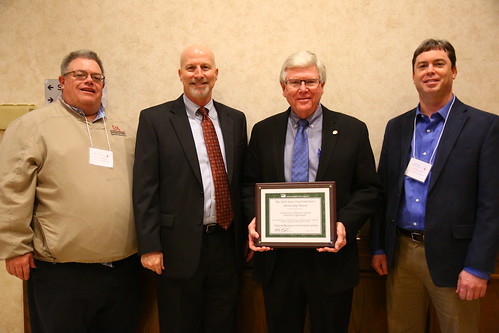Division of Agriculture receives NRCS partnership award
By Ryan McGeeney
U of A System Division of Agriculture
Feb. 14, 2019
Fast Facts:
- NRCS award recognizes partnership in conservation work
- Division of Agriculture recognized for work in water conservation; runoff monitoring
(702 words)
(Newsrooms: With additional art available at https://flic.kr/s/aHsmvw1VQf)
(Download this story in MS Word format here.)
NORTH LITTLE ROCK, Ark. – Research measuring nutrient loss in the Mississippi River Basin and training to help farmers irrigate crops and slow groundwater draws were among the reasons Natural Resources Conservation Service on Wednesday honored the University of Arkansas System Division of Agriculture with the 2018 State Conservationists Partnership Award.
Mark Cochran, vice president-agriculture for the University of Arkansas System, accepted the award on behalf of the Division of Agriculture.
Michael E. Sullivan, state conservationist for the NRCS, who presented the award, listed many attributes the organization looks for when considering nominations, and said the Division of Agriculture had made outstanding strides in helping Arkansas producers and landowners achieve shared conservation goals.
“In the field of conservation, our key pillar is sound science,” Sullivan said. “We depend on our best scientists to engage with us in developing and sharing technology, so that we’re using the most effective conservation techniques and approaches. We want to help farmers be productive, while protecting our natural resources.
“The Division of Agriculture just exemplifies that,” he said. “They have a number of people working across the research and extension fronts, and have worked increasingly with us to help meet the needs of farmers.”
Of the many issues that spring from the intersection of agriculture and conservation, Debbie Moreland, in her nomination of the Division of Agriculture, emphasized four: water quality and edge-of-field monitoring, water conservation and irrigation water management, soil health, and nutrient management.
Edge-of-Field Monitoring
Addressing hypoxia in the Gulf of Mexico, frequently tied to agricultural runoff in surface waters, was just one example of how Division of Agriculture experts have helped growers and the NRCS reach conservation goals.
“Edge-of field monitoring of runoff for nutrients and sediment are being conducted on nearly 30 fields across Arkansas for all major crops including rice, soybeans, cotton and corn as well as pastures on livestock farms,” said Mike Daniels, extension water quality and nutrient management specialist for the Division of Agriculture. “Our Discovery Farms are documenting the effectiveness of conservation practices such as cover crops, conservation tillage, land leveling, irrigation water management, rotational grazing and grassed filter strips.”
Daniels said that “results indicate that nutrient losses are small relative to nutrient applications. Conservation practices being studied are proving to be effective in reducing sediment nutrient losses.” Research is continuing as the results of the “practices can vary among fields and years, and are dependent on hydrology,” he said.
Farms and scientists
The Division of Agriculture’s Arkansas Discovery Farm program, which Daniels co-leads with Andrew Sharpley, supplies edge-of-field nutrient monitoring data that helped guide the NRCS’s 13-state initiative, the Mississippi Healthy River Basin Initiative. The partnership between the Arkansas Discovery Farm project and the MHRBI helped secure more than $78 million in conservation funding, which in turn helped implement conservation practices in multiple priority watersheds.
“Discovery Farms provide a unique opportunity for farmers to work with scientists and conservation professionals to be part of the process in finding solutions to environmental challenges,” Daniels said.
Another partnership between the Division of Agriculture and the NRCS that also shone was in funding a full-time irrigation instructor for the Cooperative Extension Service who has trained eight irrigation water management specialists, county extension agents and NRCS field personnel. Last year alone, the eight irrigation water management specialists helped develop more than 780 plans representing more than 166,000 acres. In addition, they developed more than 520 irrigation field designs representing nearly 32,000 acres.
Cochran said the award was a tribute to the daily work of the researchers, scientists and other professionals within the Division of Agriculture.
“We view our partnership with NRCS and the total conservation community as a part of our mission, so we’re delighted,” he said. “We think that here in Arkansas, we have the broad and effective partnerships to promote conservation probably as well as anyone in the country. There are so many important issues that are related to agriculture and conservation that it takes all of us to be able to make the types of improvements that we need.”
To learn about conservation in Arkansas, contact your local Cooperative Extension Service agent or visit www.uaex.uada.edu. Follow us on Twitter at @AR_Extension.
NRCS is part of the U.S. Department of Agriculture.
About the Division of Agriculture
The University of Arkansas System Division of Agriculture’s mission is to strengthen agriculture, communities, and families by connecting trusted research to the adoption of best practices. Through the Agricultural Experiment Station and the Cooperative Extension Service, the Division of Agriculture conducts research and extension work within the nation’s historic land grant education system.
The Division of Agriculture is one of 20 entities within the University of Arkansas System. It has offices in all 75 counties in Arkansas and faculty on five system campuses.
Pursuant to 7 CFR § 15.3, the University of Arkansas System Division of Agriculture offers all its Extension and Research programs and services (including employment) without regard to race, color, sex, national origin, religion, age, disability, marital or veteran status, genetic information, sexual preference, pregnancy or any other legally protected status, and is an equal opportunity institution.
# # #
Media Contact: Ryan McGeeney
Communication Services
U of A System Division of Agriculture
Cooperative Extension Service
(501) 671-2120
rmcgeeney@uada.edu
